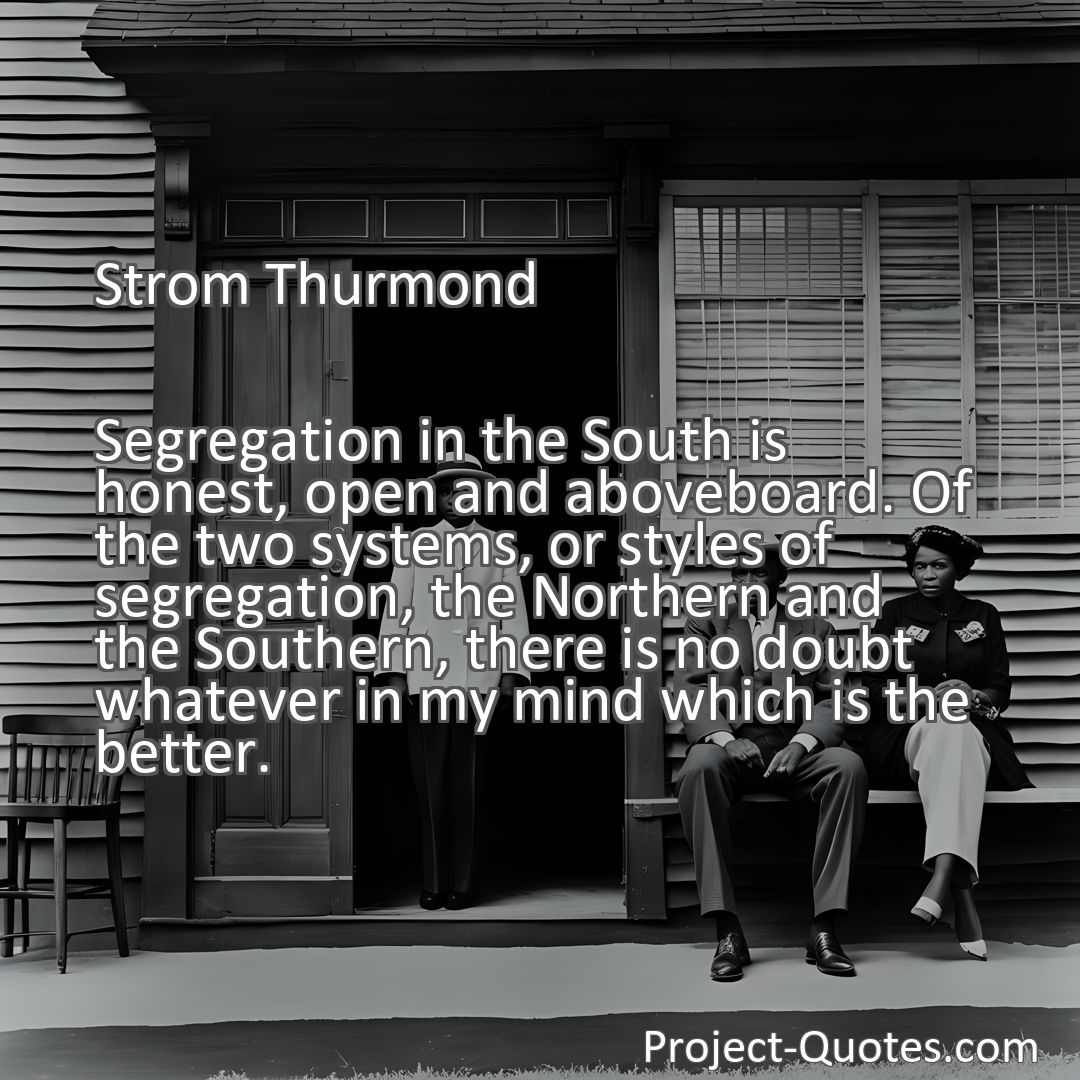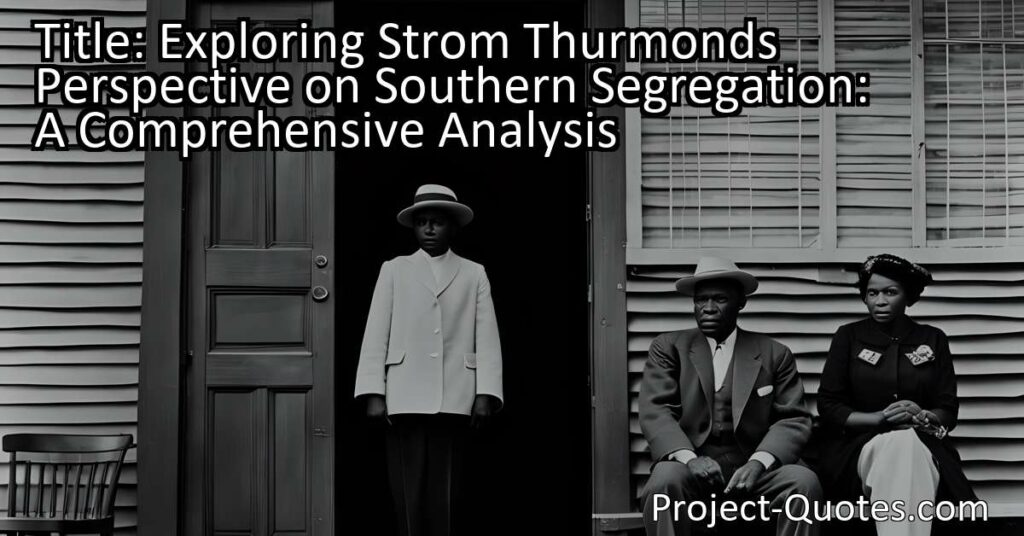Segregation in the South is honest, open and aboveboard. Of the two systems, or styles of segregation, the Northern and the Southern, there is no doubt whatever in my mind which is the better.
Strom Thurmond
Delving into the history of segregation in the Southern United States, this analysis explores Strom Thurmond’s controversial views on racial segregation. By understanding the influence of Jim Crow laws and societal norms, we can gain insight into Thurmond’s belief in the honesty and openness of Southern segregation, despite the inherent flaws and injustices within this system.
Table of Contents
- 1 Segregation in the South is honest, open and aboveboard. Of the two systems, or styles of segregation, the Northern and the Southern, there is no doubt whatever in my mind which is the better.
- 2 Strom Thurmond
- 3 Meaning of Quote – Segregation in the South is honest, open and aboveboard. Of the two systems, or styles of segregation, the Northern and the Southern, there is no doubt whatever in my mind which is the better.
- 4 Freely Shareable Quote Image
- 5 Related
Meaning of Quote – Segregation in the South is honest, open and aboveboard. Of the two systems, or styles of segregation, the Northern and the Southern, there is no doubt whatever in my mind which is the better.
Understanding Strom Thurmond’s Perspective on Southern Segregation
Introduction
Segregation has been an enduring issue throughout history, particularly prominent in the Southern United States. One individual who held a controversial viewpoint on this matter was Strom Thurmond. In his statement, “Segregation in the South is honest, open and aboveboard,” Thurmond expressed his belief in the superiority of Southern segregation compared to its Northern counterpart. Though this quote may seem perplexing to some, it is essential to delve deeper into Thurmond’s perspective and the historical context surrounding segregation to gain a comprehensive understanding of his viewpoint.
Historical Background
Segregation has its roots in the Reconstruction era following the American Civil War. As African Americans gained more rights and opportunities, Southern states enacted Jim Crow laws to enforce racial segregation. Ironically, these laws were ultimately upheld by such judicial decisions as Plessy v. Ferguson , which established the “separate but equal” doctrine.
Strom Thurmond, an ardent segregationist, was a prominent politician from South Carolina. Serving as a senator for over five decades, he held conservative views on racial issues. While many condemn segregation as an immoral and oppressive practice, it is vital to approach Thurmond’s perspective with an open mind and an understanding of the context that shaped his beliefs.
Defending the Values of Southern Segregation
Thurmond’s statement suggests that Southern segregation was honest, open, and aboveboard an assertion that needs further examination. In his view, Southern segregation may have been preferred due to its supposedly transparent nature. Unlike the North, where discrimination and racial tension were often present behind closed doors, the South openly implemented segregation laws. While on the surface, this may seem paradoxical, Thurmond likely believed that open division prevented social upheaval and violence.
Thurmond’s perspective may have been influenced by his upbringing and the prevailing societal norms during his time. In the South, segregation was seen by many as a way to preserve tradition and maintain social order. Thurmond, like numerous Southerners, grew up in an environment where segregation was an integral part of daily life. In his eyes, Southern segregation embodied a sense of consistency, ensuring that individuals of different races could live alongside each other while adhering to their cultural traditions.
Moreover, Thurmond may have perceived Southern segregation as a means of protecting the white community’s economic status and political power. The South heavily relied on its agrarian economy, and white landowners feared the potential competition and loss of political influence if African Americans were given equal rights and opportunities. By segregating schools, neighborhoods, and public facilities, Thurmond and others like him believed they could maintain this balance of power, satisfying the perceived interests of all parties involved.
Challenges and Critiques of Southern Segregation
While Thurmond advocated for Southern segregation, it is crucial to acknowledge the inherent flaws and injustices within this system. Despite his claim of honesty, Southern segregation entailed numerous discriminatory practices, unequal opportunities, and the denial of basic civil rights to African Americans. These practices perpetuated racial inequality, hindering progress and stifling potential for economic and social advancement.
Furthermore, critics argue that Southern segregation undermined the principles of democracy and stunted the growth of a more inclusive society. By separating individuals based solely on race, the South perpetuated divisions rather than fostering understanding and equality among its diverse population.
Conclusion
Understanding Strom Thurmond’s perspective on Southern segregation requires careful analysis of the social and historical context. While his statement may seem perplexing, his belief in the honesty and openness of Southern segregation must be approached with sensitivity and critical thinking. By exploring the motivations behind his viewpoint and considering the challenges and criticisms of segregation, we can gain a deeper understanding of the complexities woven into the fabric of this tumultuous period in American history.
I hope this quote inspired image brings you hope and peace. Share it with someone who needs it today!


